Coronavirus Research: Featured Activity
Researchers from the University of Bristol's Law School are working together and with partners from across society to understand coronavirus (COVID-19), its far-reaching impact on our lives and the role of policy and legislation in addressing social and ethical issues.
 Understanding how to better engage with minority groups
Understanding how to better engage with minority groups
Against a backdrop of disproportionate morbidity and mortality from COVID-19, the need to prioritise and protect ethnic and religious minorities as part of the UK’s new vaccine programme has been the focus of much media, public health and government attention. But who is considered a ‘priority’? How can public health bodies engage productively and sensitively with ethnic and religious minorities? Why is the phrase ‘vaccine hesitancy’ unhelpful? How flexible and effective are services? In a series of blogs and media articles Vice Chancellor Fellow, Dr Ben Kasstan, provides expert commentary on the government’s decision to make vaccines mandatory for NHS staff, the government report on understanding and tackling COVID-19 disparities and explores how long-running issues of trust may be directed towards the coronavirus vaccination programme. By fixating on the idea of vaccine 'hesitancy,' there's a danger of placing the problem on people rather than healthcare systems and issues of access, equity and inclusion.
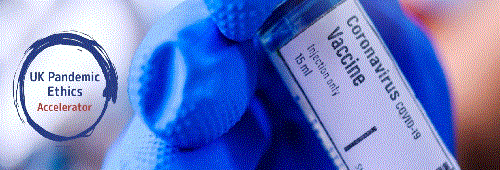 Accelerating integration of ethical thinking into policy
Accelerating integration of ethical thinking into policy
Professor John Coggon and Dr Beth Wangarĩ Kamunge are working on the £1.4 million UKRI funded Pandemic Ethics Accelerator project. This project, led by Professor Ilinia Singh at the University of Oxford, with collaborators at the Universities of Bristol, Edinburgh, Oxford, University College London, and the Nuffield Council on Bioethics, brings ethics expertise to the multiple challenges raised by the pandemic. Professor Coggon coordinates the priority area on Public Health and Health Inequalities. Dr Wangarĩ Kamunge, a Senior Research Associate, has led work including a submission to the UK Parliament's Treasury Committee's An Equal Recovery consultation. Professor Coggon's work has included a paper critiquing the contributions of Lord Sumption, a former Justice of the Supreme Court, to public debates on coronavirus regulations and policy.
 Addressing the challenges of fraud in a pandemic
Addressing the challenges of fraud in a pandemic
Dr. Jennifer Collins has been awarded £39,410 by UKRI/AHRC to fund a new research project, 'Fraud During a Pandemic: Identifying and Appraising New Challenges for the Criminal Justice Response in England and Wales'. The global Covid-19 pandemic has presented new opportunities for those looking to commit fraud, capitalising on new vulnerabilities (of systems, organisations, and members of the population), propelled by sophisticated cyber-enabled schemes. The research aims to map the landscape of how fraudulent conduct is changing during the pandemic, in collaboration with the Crown Prosecution Service (CPS) and discussions with fraud policymakers and practitioners. It also aims to provide a normative framework for how emerging dishonest conduct ought to be charged and prosecuted at this time. Research developments will be shared on twitter @FraudPandemic.
 Reshaping early years care
Reshaping early years care
For millions of parents with young children, juggling work and childcare is a long-standing challenge. The Covid-19 pandemic has added further layers of complexity and is leading to changes which threaten to widen inequalities in society and the workplace. The Covid-19 pandemic has affected those providing childcare in different ways: nurseries being forced to close, parents looking after young children while home working for extended periods, and grandparents and other family members being unable to provide care due to pandemic restrictions. The Law School’s Dr Katie Cruz, is part of a research team that has been awarded funding of more than £430,000 from the Economic and Social Research Council (ESRC) to assess the impact of coronavirus on early years childcare provision in the UK.
 Protecting detainees and those deprived of their liberty
Protecting detainees and those deprived of their liberty
A feature piece on the Times Higher Education website details the University of Bristol Law School's research safeguarging detainees. ‘Places of detention’ is a phrase encompassing a diverse range of institutions, from prisons and psychiatric institutions - to children in secure accommodation, social care homes and immigration detention facilities. Many provide the perfect conditions for both the virus to thrive, and for the human rights of those detained to be severely compromised. Academics from the University of Bristol’s Law School are at the forefront of research protecting those deprived of their liberty.
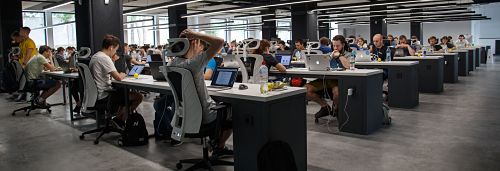 A new chapter in Employment Rights?
A new chapter in Employment Rights?
In an interview with BBC Points West Professor Tonia Novitz provided expertise on the obligations of employers to provide safe workspaces, and the rights of employees, amid anxieties around coronavirus and the lifting of lockdown. While the Employment Rights Act protects employees from detriment or dismissal if they refuse to return to work due to reasonable fears for their safety, the lack of litigation and of current, concrete advice to support both employers and employees has left people uncertain as to how the Act’s terms will be interpreted.
 Coping in a crisis – the compassionate way forward
Coping in a crisis – the compassionate way forward
In partnership with Social Value UK, Professor Charlotte Villiers has created a guide for coping in the workplace with COVID-19, and how you can be a responsible leader for your team and workplace. As the lockdown is lifted many businesses will struggle to recover, leaving people without work or more insecure than ever before as their social and economic well-being suffer. Such a traumatic event requires a compassionate response from employers to enable their workers to cope with the challenges they face. Professor Villiers has also written a blog on the issue.
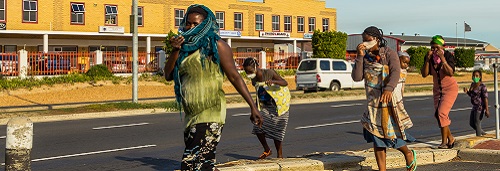 Global public health: An agile response
Global public health: An agile response
Over recent months, Professor Keith Syrett has questioned the European Commission's roadmap for the lifting of coronavirus measures, after being slow to respond with recommendations for putting protective measures in place. He provided the UK perspective for a Harvard Law symposium on the global response to COVID-19, particularly focusing on the severity of restrictions on liberty in the UK and the indirect impact on vulnerable groups. He has also assisted local NHS decision-makers on the ethical and legal dimensions of setting priorities for treatment during the pandemic. Against this backdrop, and in collaboration with Professor Helen Lambert (Population Health Sciences), Professor Syrett has since helped establish a rapid response fund to look at Covid-19 from a global public health perspective and promote the welfare of vulnerable communities around the world.
 A perfect storm: Patients, psychiatrists and the pandemic
A perfect storm: Patients, psychiatrists and the pandemic
A blog by Professor Judy Laing outlines the potential of the pandemic to spark a major mental health crisis, with stringent lockdown measures increasing social isolation and psychological distress, compounded by fear of infection and anxiety about losing income and livelihoods. Judy, an expert in mental health law, rights and policy, is currently advising a local mental health trust and a Clinical Commissioning Group on the ethical and human rights implications of the Covid pandemic. She has also been awarded rapid response funding to conduct research into the implications of Covid 19 in detention settings for the treatment and wellbeing of detainees.
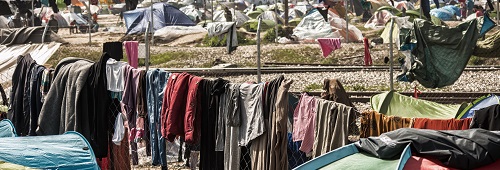 The pandemic and precariously placed groups
The pandemic and precariously placed groups
In collaboaration with International Centre for Counter-Terrorism (The Hague) and the University of Melbourne, Dr Devyani Prabhat's latest research project focuses on the impact of the pandemic on already precariously placed groups, particularly exploring the legal issues of children of ISIS fighters. These are children that remain in camps in conflict ridden areas, in Syria or surrounding areas, despite having associations with countries which could repatriate them. The situation has been significantly compounded by COVID-19.
 Futures of work: Gender inequalities and compassion
Futures of work: Gender inequalities and compassion
In this COVID-19 special issue of Futures of Work, Professor Joanne Conaghan explores the gendered impacts of COVID-19 on work and workers - arguing that inequality is neither random nor unfortunate, but instead structurally engineered, legally enforced, and politically and ideologically driven. Whilst Professor Charlotte Villiers asks if the pandemic could lead to more compassionate workplaces - and what could become the new normal from a corporate governance perspective for the treatment of employees and workers.
 Furloughing and Fundamental Rights: The Case of Paid Annual Leave
Furloughing and Fundamental Rights: The Case of Paid Annual Leave
In the latest of a series of UK Labour Law Blog, Professors Alan Bogg and Michael Ford QC, raise awareness of the urgent need to clarify the interaction of the Coronavirus Job Retention Scheme with a host of existing employment rights. A key question will be the intersection between ‘furloughing’ under the Scheme, and the right to paid annual leave. The issues raised in these blogs were explored further in an Industrial Law Society webinar, "Problems with the Coronavirus Job Retention Scheme".
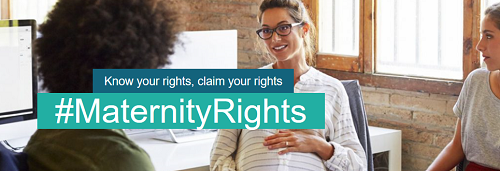 Statutory Sick Pay, the Coronavirus Job Retention Scheme and pregnant workers
Statutory Sick Pay, the Coronavirus Job Retention Scheme and pregnant workers
In this short Advice developed for the UK Charity, Maternity Action, Professor Michael Ford addresses a specific problem which has arisen in relation to how the Coronavirus Job Retention Scheme applies to the many pregnant women sent home on sick leave by their employers and paid Statutory Sick Pay in the mistaken belief by employers that they were required to self-isolate.
 COVID 19 and Labour Law in the UK
COVID 19 and Labour Law in the UK
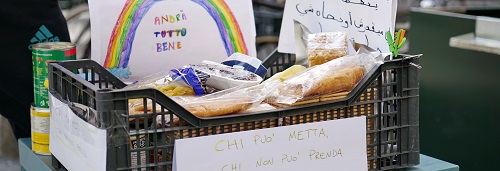 International Economic Law and Protecting the Right to Food in Times of Crisis
International Economic Law and Protecting the Right to Food in Times of Crisis
In this IEL Collective Conversation Dr Clair Gammage joins Professor Michael Fakhri, the newly appointed UN Special Rapporteur on the Right to Food, to discuss the likely effects of the pandemic on food security and how a human rights-based approach to food would alter current approaches to trade.
 Procurement in the time of COVID-19
Procurement in the time of COVID-19
Counterintuitively, at a time of heightened public expenditure, public procurement rules are ‘deactivated’ to allow authorities to do what they can to respond to the extremely urgent need for the public sector to buy additional supplies and equipment. In this article in the Northern Ireland Legal Quarterly, Professor Albert Sanchez Graells reflects on public procurement regulation in the face of the COVID-19 pandemic - and the longer term impact on it.
 COVID-19: Tracking advances in health policy and practice
COVID-19: Tracking advances in health policy and practice
Professor John Coggon, in collaboration with partners across the four nations of the UK, is leading an Elizabeth Blackwell Institute-funded project to track and analyse COVID-19 related developments in law and policy as these apply to health professionals and the contexts in which they work. The project will analyse these with reference to concerns about public health ethics, social justice, the protection of human rights, and respect for the rule of law.
 Using the past to influence the future
Using the past to influence the future
In an article in the Northern Ireland Legal Quarterly, Professor Catherine Kelly argues that a Grand Prize to incentivise research into a vaccine for COVID-19 is probably unnecessary and that the more expansive reward-style approach embraced by Britain in the 18th and 19th Centuries is a more useful starting point for thinking about how to move towards a proactive innovation system.
 Legislating in a crisis: Job retention scheme
Legislating in a crisis: Job retention scheme
In a series of UK Labour Law blogs, since cited in a House of Commons Briefing Paper, Professors Alan Bogg and Michael Ford analyse the introduction of one of the most remarkable government initiatives in the history of peacetime labour law - a scheme of economic support to avoid mass redundancies as the economy halted in its tracks.
 Protecting the incarcerated during COVID-19 pandemic
Protecting the incarcerated during COVID-19 pandemic
In his role as Chair of the United Nations Subcommittee on Prevention of Torture (SPT), Professor Sir Malcolm Evans has set out detailed advice and measures which governments and independent monitoring bodies should take to reduce health risks posed by coronavirus in the prisons, immigration detention facilities, closed refugee camps, and psychiatric hospitals for which they are responsible. Sir Malcolm introduces the advice in a special issue of an International Prisons and Corrections Association newsletter, ADAPTING TO COVID - 19, Prison Oversight and Monitoring During a Pandemic (PDF, 1,277kB).
Media Enquiries
If you want to get in touch with any of our team for comment, please contact press-office@bristol.ac.uk.
 Right to Health: What can we learn from the UK’s response
Right to Health: What can we learn from the UK’s response
The UK’s response to COVID-19 has been widely criticized by scientists and the public. According to EuroMOMO, a European mortality monitoring initiative, the excess mortality that may be attributable to COVID-19 in England is one of the highest in Europe, second only to Spain. In the latest issue of Health and Human Rights Journal, Research Associate Lisa Montel contributed to an article that looked at an area that has received much less attention, examining critically the extent to which the government’s response to COVID-19 complied with the legal framework of the right to health and assessing its suitability in times of a pandemic.
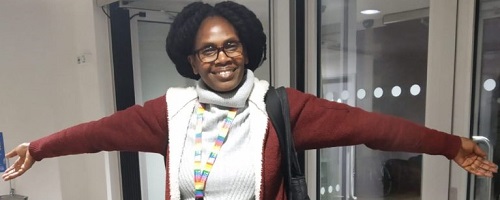 The Wellspring Settlement
The Wellspring Settlement
The Wellspring Settlement is a community anchor group that wanted to capture the impact of its support during lockdown on those using its services. The resulting research paper, produced in collaboration with students at the University of Bristol, and supervised by the Law School's Professor Morag Dermont, indicated that the assistance provided by the Wellspring Settlement enabled the community to look beyond their immediate problems and begin to strive for a better future. The research went on to support a successful bid by the Wellspring Settlement to secure £98k funding to boost the aspirations of people living in the Lawrence Hill area, one of the most deprived wards in the UK. Judith Kubiye (photo), a single mum from Kenya was one of the students involved in the project. Find out more about what being involved meant to her.